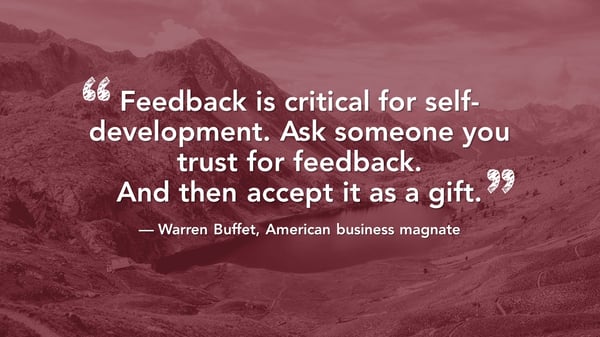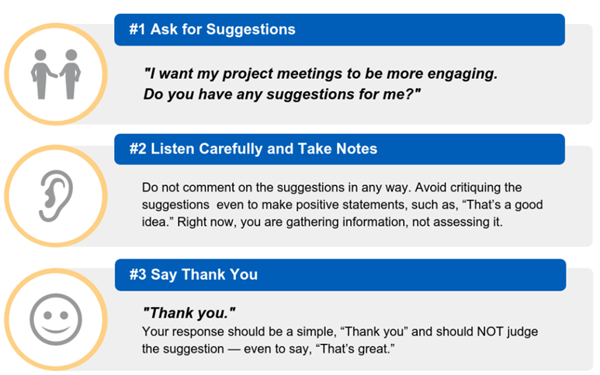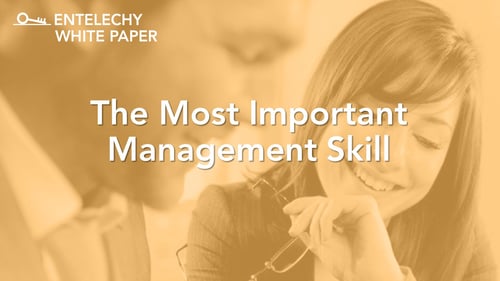Perhaps the single greatest productivity and engagement tool is feedback. In fact, we've identified the ability to give feedback effectively as the #1 most critical management skill a leader can possess. Without feedback, we — and those around us — cannot hope to improve.

Yet feedback — both giving and receiving — is considered one of the most challenging things one can do. Perhaps it’s the way we’re wired as humans. We’re empathic creatures and don’t want to hurt the other person. We’re respectful and don’t want to judge. We’re vulnerable and don’t want to be told that we didn’t measure up. We’re sensitive and knowing that we could have done better is … well, awkward.
And perhaps the most often overlooked path to creating a culture where freely giving and receiving feedback is the norm rather than the exception is YOU! The quote about “be the change you expect in others” could have been written about you as leader building a feedback culture with your team, business unit, or organization.
Obviously, being open to feedback from others is a start. However, as a leader, you’re unlikely to get the level of sincere, honest feedback you’d like — and that others would need to see in order to feel more comfortable in providing feedback. Your employees simply are too fearful of the possible ramifications of providing you feedback.
Instead of saying you’re open to feedback, try asking for advice instead. What’s the difference? Everything!
- Feedback is often viewed as judgmental; advice is viewed as something to consider or a thoughtful suggestion.
- Feedback is about something that’s already happened (which you couldn’t change anyway); advice is about the future.
- Feedback is seen as a directive … something that one must do; advice is viewed as optional.
Marshall Goldsmith, author of the best-seller, What Got You Here Won’t Get You There, states that inviting input (asking for advice) is one of the most critical skills required of leaders. Asking for input is also one of the ways to build trust within your team and to create a culture of openness and transparency. Asking for advice — Marshall calls it Feedforward — is perhaps the quickest and most effective way to create a culture of openness.
Here's how it works:

The key — and the challenge — is to avoid commenting or judging the person’s suggestions. When the goal is to create a culture of feedback — with the openness and psychological safety that entails — we need to avoid the appearance of judging. Here are some examples of judging that may squelch input:
- “I tried that before and it didn’t work.”
- “My group will never go for that.”
- “It doesn’t feel like me.”
- “That’s a nice idea.”
Note that even positive judgment is judgement and we’ll want to avoid it (which is challenging because we’re conditioned to respond in the affirmative. Instead of responding in the affirmative to the suggestion, respond in the affirmative to the sharing: “Thank you for your insights! I really appreciate it!”
While Marshall focuses on the INFORMATION that you get when you ask for input from others, there’s an equally positive RELATIONAL effect that comes from the asking. When you ask another person for their input, they feel buoyed by your request … that you think that much of them to ask THEM for their thoughts and suggestions.
Feedforward works for two simple reasons. First, when you request advice, you’re asking for some future event; you’re not asking for judgment on a past event. Second, it’s implied that you may or may not use the advice provided — it’s optional. These two elements — future-focus and optional — are key to Entelechy’s Feedback Model. When providing feedback we suggest using Power Phrases like “To make it even better the next time…” and “… you may want to …” By focusing on the future (the next time) and by making the feedback optional (you may want to), your feedback leverages the very things that make feedforward so effective. You can learn more about our Feedback Model (and the other two performance conversations Coaching and Difficult Conversations) by clicking the button below:
Asking for advice — or feedforward — helps build relationships AND begins to create a culture where feedback and growth are the norm, not the exception.
Recommended Reading
Interested in further honing your feedback — and feedforward — skills? You'll enjoy this additional content from Entelechy:
 |
 |

